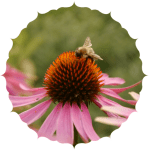You decided to grow organic because you want to grow the healthiest food. You want to take care of the land and encourage healthy soil, healthy plants, and strong living systems. So, it’s vitally important that you start with organic seeds.
Why? Because every seed has a backstory.
Put simply, conventional seeds are grown in conventional systems: synthetic fertilizers and harsh pesticides. Organic seeds are grown in organic systems: with a focus on soil and plant health, with biochar soil activator and pest control.

But let’s dig into this a bit deeper.
Organic seeds are bred to perform well in organic systems. That means the seed crop was grown organically, without the use of chemical fertilizers or harsh pesticides. Instead of being artificially propped up, the crops are grown to survive and thrive in systems that rely on healthy soil, using the same techniques that you’ll use to grow your garden.
If for no other reason, you should buy seeds that are bred to grow well in an organic garden. When you do, you’ll ensure you’re starting out with varieties that have the strongest natural pest and disease resistance.
There are other reasons to choose organic seeds, too.

To harvest seeds, crops must stay in the field much longer than food crops in order for the seeds to mature. Think of zucchini: the best eating is before the seeds have fully developed, so we harvest the tender fruit, typically no more than 8” long. When harvesting for seeds, we let the fruit grow to baseball-bat proportions, giving the seeds inside time to fully mature into viable seeds.
The longer a crop stays in the field, the higher its potential is for being bombarded by pests and diseases.
In the case of organic seeds, that means the seed farmer must keep the plants healthy all the way to seed maturity, pulling out plants that get hit by pests and diseases and keeping the ones that make it healthy all the way through the long season.
This selecting process means you’re getting seed from the healthiest, strongest plants, which in turn will pass on those genetics to the future generation of seeds.
Conventionally grown seed stays in the fields just as long. The difference, though, is that they are grown outside of organic standards.
Because seeds aren’t classified as food, farmers are allowed to apply more pesticides to the crop. Coupled with the fact that seed crops spend much more time in the field, this means that conventional seeds carry a much higher pesticide load than conventional food does.
This means two important things for the organic grower:
- The upstream environmental effects of conventional seed are detrimental, both for the environment and for the farm workers exposed to pesticides.
- Conventional seed was bred to perform with the help of synthetic fertilizers and pesticides and may not perform as well without them in an organic garden.
As an organic grower, I want to know that the seeds I start with were grown in a way that encourages life.
That includes the lives of the farm workers who tended to the seed crop, the lives of the insects and animals around the farm, the life of the soil, and the life of the water, which far too often is polluted by farm runoff.
Organic gardeners and farmers have so much power to heal the soil, to care for the environment, and to care for people all at the same time.
It all starts with a seed. An organic seed, that is.
Where to find organic seeds:
 High Mowing Organic Seeds, we get 90% of our seeds from High Mowing (one of our team members also spent about 5 years working there and can attest to the heart and passion of all the folks there).
High Mowing Organic Seeds, we get 90% of our seeds from High Mowing (one of our team members also spent about 5 years working there and can attest to the heart and passion of all the folks there).
Fruition Seeds, a seed company in Naples, New York, specializing in regionally-adapted organic seed.
Hawthorn Farm Organic Seeds, specializing in heirloom and open-pollinated seed, only ships within Canada
Johnny’s Selected Seeds, offers a mix of organic and conventional, so be sure to look for “OG” next to the variety name
Fedco Seeds, a cooperative specializing in cold-hardy seeds; offers a mix of organic and conventional, but goes to great lengths to let you know where the seed is coming from. Transparency is awesome. Also offers trees and bulbs.
 Do you have a favorite organic seed company not listed here?
Do you have a favorite organic seed company not listed here?
I love finding new seed companies to support, and I’d love even more for you to let me know by listing it in the comments below 😊
Thanks!

